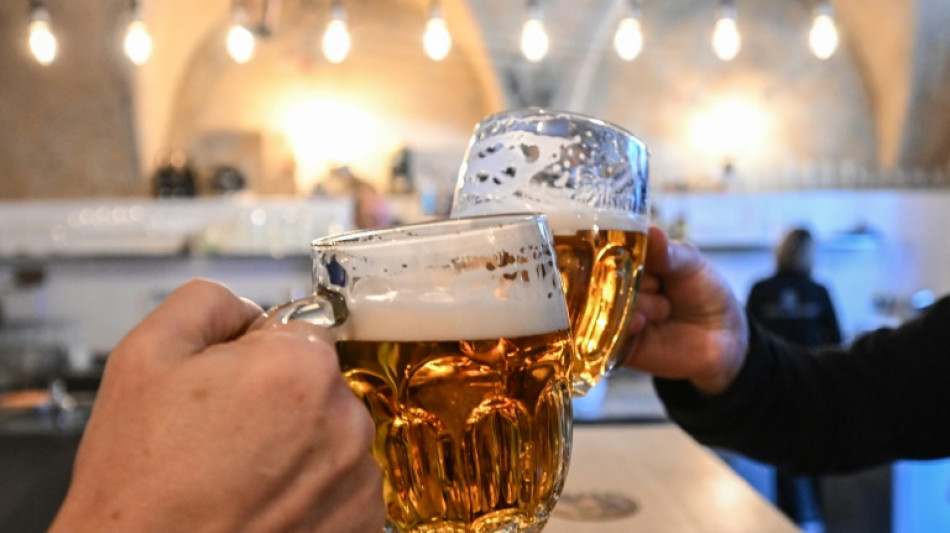

Czech beer culture eyes UNESCO listing as pubs take hit
Going to a pub several times a week to meet friends, media consultant Gabriela Galetkova hopes Czech beer culture -- which is taking a hit as bar visits dip -- will be internationally recognised.
"I won't buy beer to drink at home. For me, Czech beer culture is about meeting people in a typical Czech pub," the 54-year-old told AFP in a Prague bar serving the trademark Pilsner lager with thick froth.
While many beer drinkers in the central European country are turning away from pubs, often to save money, Czech beer professionals are seeking listing by UNESCO among the world's cultural heritage as a possible boost.
Czech beer culture deserves a place on the UN agency's intangible heritage lists owing to its "global reputation", said Tomas Slunecko, head of the Czech Beer and Malt Association.
"Wherever you go in Europe or the world, people ask you about Czech beer," the former diplomat told AFP.
If Czech beer culture gets listed by UNESCO, it will be the world's second after Belgium, listed in 2016 -- which according to Slunecko "really boosted the reputation of local beer making, not only inside Belgium but also abroad".
The Czech culture ministry already put it on the national list in January -- a necessary condition for international recognition -- while Slunecko and others are embarking on promoting their bid.
- No longer cheaper than water -
The Czech beer-making tradition is over a thousand years old and beer is omnipresent in Czech history and culture, while local lagers have made Czech beer-makers famous and inspired brewers worldwide.
The country has more than 550 breweries including 500 small ones that have emerged during a boom over the past two decades.
Czech breweries employ 65,000 people, make around 20 million hectolitres of beer a year and export roughly a quarter, mainly to other EU members such as Germany, Poland, Slovakia and Hungary.
But while the tradition is rich and colourful and the reputation solid, Czech drinkers are shirking their pub duty.
Beer consumption in the country of 10.9 million retained a world-leading level of 128 litres per person in 2023 but is down from 143 litres a decade ago, said Slunecko.
Beer prices have doubled over the past decade on tax hikes and higher input costs, and the popular tipple is no longer cheaper than water in Prague pubs, where a pint of Pilsner Urquell costs around CZK 70 ($3).
This has gradually led drinkers to turn to supermarkets for cheaper bottled beer, industry data have shown.
The Covid-19 pandemic made things worse as it shuttered pubs and closed borders for months, sending more drinkers to their living room sofas and reducing the number of foreign tourists who drink a hefty portion of the beer sold in Czech pubs.
The Czech Chamber of Commerce said that 15 percent of local venues closed and another 15 percent changed hands due to the pandemic.
Many small towns and villages now lack a place to go for a pint.
"The share of beer consumed in pubs and at home used to be 50-50. At present pubs only make up 30 percent," Slunecko said.
Many Czechs also opt for a healthier lifestyle or prefer to meet their friends online, he added.
"The decline is a trend that we can see elsewhere in Europe," said Slunecko.
- 'Social network' -
Meeting people is the main reason why Czechs go to pubs, said sociologist Jiri Vinopal, citing his continuous research running since 2004.
"Czech beer culture is something that helps people connect and keeps society together, create an identity, whether locally or at the national level," he added.
Slunecko said women drinkers could help end the downtrend as an increasing number now go to pubs, attracted by their growing standard, variety of drinks on offer and quality food.
"It's about quality replacing quantity. I think the cultured environment and the broad offer is a way to win drinkers back," Slunecko said, likening pubs to "a social network".
"A pub is a pleasant place to meet. And there's nothing wrong about drinking beer," he said.
L.Sastre--MP




